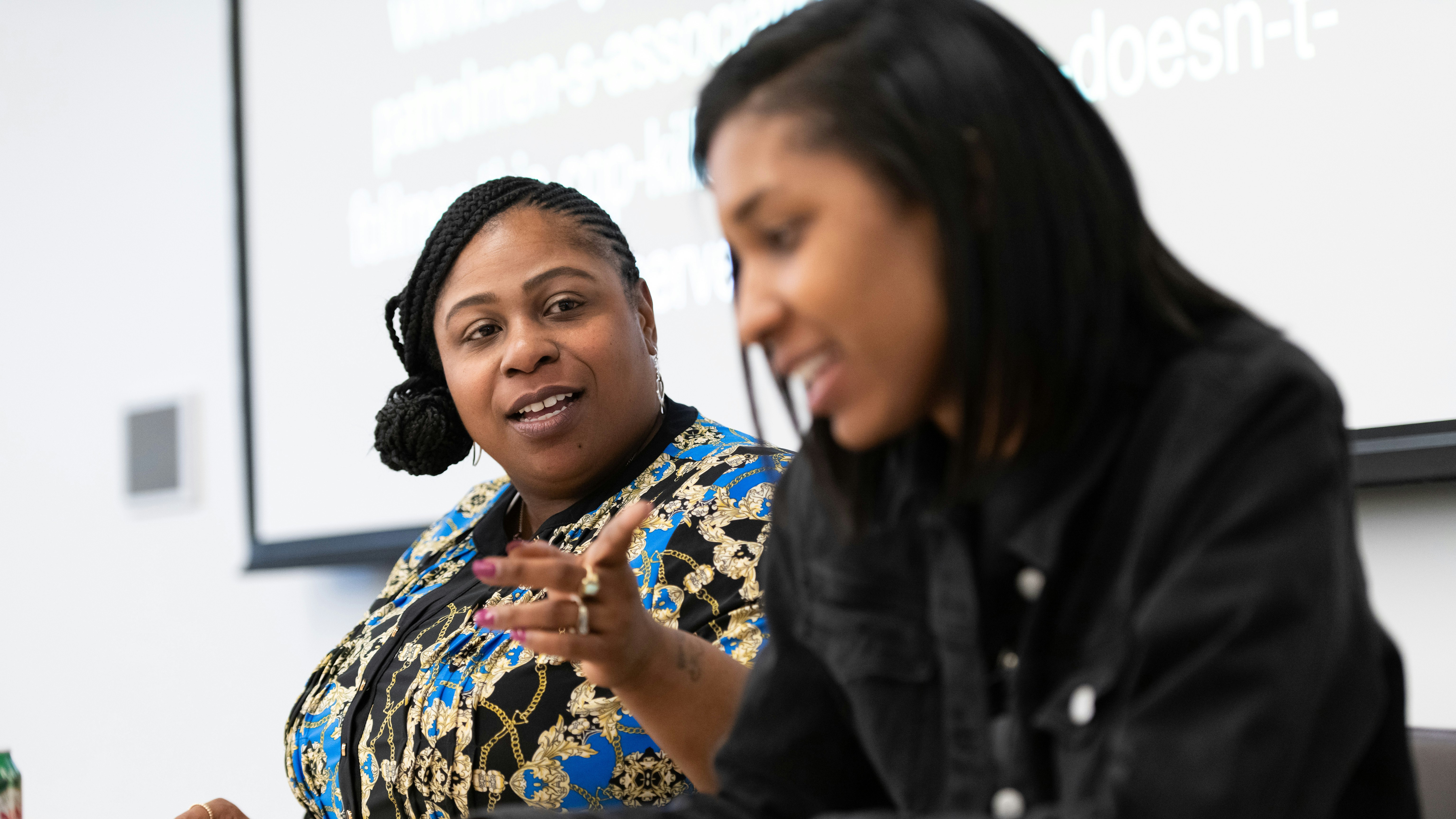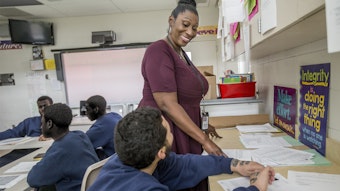Law, Education, and Justice

Historically high rates of incarceration in the United States constitute a national crisis. Harvard Radcliffe Institute provides intellectual and physical space for students, fellows, faculty members, and affected communities to explore the historic causes and current consequences of mass incarceration, as well as a range of solutions to this systemic problem.
We advance scholarly research and public understanding of issues related to mass incarceration by:
- investing in the work of leading scholars and public intellectuals through our Fellowship Program and designing seminars that tackle specific policy questions;
- providing opportunities for students to grapple with complex issues in extracurricular working groups and through research grants;
- engaging national and international audiences through public programming that examines mass incarceration and its consequences;
- welcoming and building partnerships with individuals and communities affected by incarceration; and
- providing access to important research materials, including the papers of Angela Y. Davis—a major figure in the prison abolition movement—which are housed at Radcliffe’s Schlesinger Library.
The Institute is actively building new partnerships, sponsoring innovative research, and developing programming that explores the broad impacts of mass incarceration, working closely with individuals and communities directly affected by this crisis.
Explore the different strands of our work below:
Research Support
The Institute sponsors a series of private multidisciplinary research seminars led by Harvard- and Radcliffe-affiliated scholars and practitioners that grapple with issues related to law, education, and justice. Each seminar convenes 10–15 experts from around the world to advance research and policy in a collaborative setting.
Select research seminars currently slated for academic year 2020–2021:
- Co-option or cooperation? A critical look at “public health approaches” to criminal justice. Mary T. Bassett, Harvard T.H. Chan School of Public Health, and Danielle Allen, Faculty of Arts and Sciences and Edmond J. Safra Center for Ethics, Harvard University
- Racism, Trauma, and School Pushout: Transforming School Cultures for Equity and Student Success. Michael Gregory, Harvard Law School, and Susan Cole, Harvard Law School
In addition, Harvard Radcliffe Institute awards research grants to Harvard undergraduate and graduate students who are pursuing research and creative projects relevant to law, education, and justice. Projects supported by Radcliffe in 2020 explored the relationship between incarceration and income inequality, the impact of elections on prosecutorial discretion, and links between antiviolence police strategies and educational outcomes, among others.
In the recent years, the Institute has also invited scholars and practitioners working on projects related to law, education, and justice to apply for Radcliffe fellowships.
Awarded fellowships include:
- Orisanmi Burton, American University. A Language of Liberation: Prisons, Letter Writing, and the (Un)Making of Carceral Subjects
- Jarvis R. Givens, Harvard Graduate School of Education. The American School in Red, White, and Black
- Christopher Harris, University of Iowa. Speaking in Tongues
- Michael K. Honey, University of Washington Tacoma. They Never Can Jail Us All: Repression, Resistance, and the Freedom Struggle, a Memoir and History
- Camara Phyllis Jones, Morehouse School of Medicine. Tools for a National Campaign against Racism
- Ibram X. Kendi, Boston University. Bones of Inequity: A Narrative History of Racist Policies in America
- Khalil Gibran Muhammad, Harvard Kennedy School. Lessons Learned from 50 Years of Civil Rights and Wrongs
- Devah Pager, Faculty of Arts and Sciences, Harvard University. The Consequences of Legal Debt
- Rajiv Sethi, Barnard College. The Geography of Lethal Force
- Kaia Stern, Harvard Graduate School of Education and director of the Prison Studies Project, Harvard University. Transformative Work on Race and Justice
- Jackie Wang, Eugene Lang College of Liberal Arts, The New School. The Carceral Laboratory: Risk Assessment and the Politics of Bail, 1898–1984
- Bruce Western, Faculty of Arts and Sciences, Harvard University. Leaving Prison and Entering Poverty: The Boston Reentry Study
Student Engagement
Undergraduate and graduate students representing seven Harvard schools are participating in working groups led by Kaia Stern, an expert in carceral studies, cofounder and director of Harvard’s Prison Studies Project, and Radcliffe’s inaugural practitioner-in-residence. These noncredit, seminar-style courses are hosted at Radcliffe and bring together students interested in pursuing interdisciplinary research and service related to the themes of law, education, and justice.
Stern explains, “Students from across Harvard are hungry for meaningful opportunities to engage with pressing social issues. This kind of engagement has proven to be transformative. At Radcliffe, students have a rare opportunity to come together from across the University to ask incisive questions, to learn from one another, and, ultimately, to take steps to better the world.”
This year-long working group focuses on gendered and racialized injustice/punishment in the United States. The group draws from community voices, academic texts, media, and narrative sources to give particular attention to factors long associated with gender, race, and punishment, such as madness, sexuality, sin, poverty, and citizenship. In fall 2020, members of the working group included students from the I-Can Academy, located inside Suffolk County’s Nashua Street Jail. Although their participation is currently on hold due to the public health crisis, we are hopeful that they will be able to join the working group as soon as guidelines allow.
From Plantations to Prisons: A Spotlight on Harvard
From Plantations to Prisons: A Spotlight on Harvard University studies the history of punishment in the United States. The fall working group established a framework for punishment reflecting a continuum between chattel slavery and mass criminalization, including mass imprisonment and mass deportation, and focused on the religio-historical roots of the US penal industry. The spring working group will spotlight Harvard University’s relationship to the contemporary punishment system with a special focus on the University’s historical ties to slavery.
Public Programming
Harvard Radcliffe Institute is committed to engaging in vital conversations—from small group gatherings to major public conferences—that create dialogue around difficult and complex issues related to the effects of mass incarceration. We aim to ask questions, raise awareness, inform policy, and improve outcomes in the critical areas of law, education, and justice.
The Institute sponsors a wide range of public programs that engage with the themes of the law, education, and justice and educate the public on the deep impacts of mass incarceration. Our programs are all free and open to the public and provide opportunities for attendees to pose questions of the participants. Students, faculty, and members of the public with a wide array of backgrounds and interests from across the nation and around the world regularly attend Radcliffe’s programs.
Selected programs include:
- “Vision & Justice: A Convening,” 2019
- “Radical Commitments: The Life and Legacy of Angela Davis,” 2019
- “Health, Inequity, and COVID-19,” 2020
- “Naming Racism,” 2020
- “Decarceration and Community: COVID-19 and Beyond (Part I),” 2020
- “Decarceration and Community: COVID-19 and Beyond (Part II),” 2020
- “American Policing and Protest: Abolition and Ethics from Slavery to Current Times,” 2020
- “Is Now the Time to Build a Better System? K–12 Education and Systemic Racism in the Era of COVID-19,” 2020
- “Perfecters of This Democracy: A Conversation with Nikole Hannah-Jones,” 2020
- “Education Justice: Why Prison Classrooms Matter,” 2020
- “Education Justice: Centering Student Voices,” 2020
- “Antiracism in Higher Education: A Conversation with Ibram X. Kendi,” 2020
- “The Impact of 2020 on Higher Education: Colleges, COVID-19, and a Time of Racial Reckoning,” 2020
Community Partnerships
Engaging with individuals, families, and communities, affected by incarceration is central to Radcliffe’s work.
Summer of HOPE
Summer of HOPE (High expectations, Opportunities, Pathways to success, and Encouragement) is a partnership led by the Black Ministerial Alliance of Greater Boston in collaboration with the Juvenile Alternative Resolution Program of the Suffolk County District Attorney’s Office, the Massachusetts Department of Youth Services, and community partners including the Black Ministerial Alliance and Mass Housing. In support of the initiative, seven Boston-area higher education institutions, including Harvard Radcliffe Institute, host weeklong justice-focused workshops for system-involved Boston Public School students during the summer.
Radcliffe began partnering with Summer of HOPE in 2019, offering a curriculum focused on socio-emotional learning, personal narrative, and the concepts of justice and injustice. The Institute’s weeklong workshop convenes facilitators—some of whom are graduate students—and guest speakers from across Harvard to work with system-involved students to build a community of trust and respect, engage in difficult conversations, explore one another’s stories, and delve into examples of civic leadership from the holdings of Radcliffe’s Schlesinger Library on the History of Women in America, which houses the papers of Angela Y. Davis and other prominent women leaders and activists. The workshop connects personal stories to broader themes of justice and injustice in society, while simultaneously introducing key analytical skills such as identifying research questions and exploring approaches to qualitative interviewing.
I-Can Academy
The I-Can Academy is an educational and vocational training program located inside Suffolk County’s Nashua Street Jail that seeks to build skills for success and, ultimately, reduce recidivism. In the spring of 2020, Harvard graduate and undergraduate students participating in the Institute’s interdisciplinary working group on gender and punishment visited the jail to exchange ideas about toxic masculinity and the role of gender and punishment in our society. The initial workshop was such a success that the Suffolk County Sheriff’s Office invited an expanded partnership with Harvard Radcliffe Institute, leading to a new collaboration with Suffolk County Jail and members of the I-Can Academy in the fall of 2020.
Public health and social distancing restrictions presented new challenges: incarcerated individuals have even less access to interactive learning opportunities during the COVID-19 pandemic than under normal circumstances. To help meet this need, Radcliffe partnered with Harvard’s Mindich Program in Engaged Scholarship to provide laptops for members of the I-Can Academy participating in the fall 2020 working group, titled “Say Her Name: Gender, Race, and Punishment.” Together, working group students at Harvard and the I-Can Academy worked with Kaia Stern to cocreate an interactive learning program and explore the systems of gendered and racialized punishment that contribute to school suspensions, arrests, incarceration, and state violence. The I-Can Academy partnership will continue, subject to public health guidelines, through the spring of 2021, with the Institute providing certificates of completion for the I-Can students.
Education in Carceral Spaces
The Institute’s partnership with the I-Can Academy is proof of concept for future initiatives designed to expand access to—and provide academic credit for—interdisciplinary education programs in carceral spaces. Harvard Radcliffe Institute is in conversations with several Greater Boston–area institutions to develop new educational partnerships to expand educational opportunities for incarcerated students.
